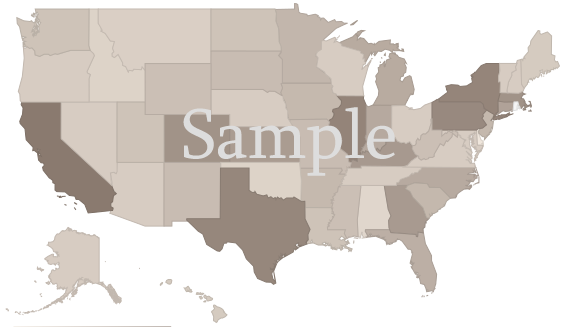| Standard Report | Premium Report | |
|---|---|---|
| Current State of the Industry |  |
 |
| Market Size (industry trends) |  |
 |
| Market Forecast (5-year projection) |  |
|
| Products/Services Breakdown |  |
|
| Revenue per State |  |
 |
| Financial Metrics |  |
 |
| Salary & Compensation Statistics |  |
 |
| Public Company Information |  |
 |
| Key Private Companies |  |
|
| Government Vendors |  |
|
| Instant Download - Available immediately upon purchase |  |
 |
Download both PDF and Excel


|
 |
 |
| Download now: |


2026 U.S. Industry Statistics & Market Forecast - Funds, Trusts, and Other Financial Vehicles
Market Size & Industry Statistics
The total U.S. industry market size for Funds, Trusts, and Other Financial Vehicles:
Industry statistics cover all companies in the United States, both public and private, ranging in size from small businesses to market leaders.
In addition to revenue, the industry market analysis shows information on employees, companies, and average firm size.
Investors, banks, and business executives use growth rates and industry trends to understand the market outlook and opportunity.

| Statistics | 2020 2021 2022 2023 2024 2025 | |
|---|---|---|
| Market Size (Total Sales/Revenue) |
Order at top of page | |
| Total Firms | ||
| Total Employees | ||
| Average Revenue Per Firm | ||
| Average Employees Per Firm | ||
| Average Revenue Per Employee | ||
Market Forecast
Market forecasts show the long term industry outlook and future growth trends. The following extended five-year forecast projects both short-term and long-term trends.

| Forecast / Industry Outlook | 2025 | 2026 | 2027 | 2028 | 2029 | 2030 |
|---|---|---|---|---|---|---|
| Market Forecast ($ millions) | ||||||
| Projected Industry Growth Rate (%) | ||||||
Industry Insights
Major trends affect the Funds, Trusts, and Other Financial Vehicles industry include:- Increasing regulatory scrutiny and compliance costs
- Rise in automation and fintech innovations
- Shift towards sustainable and socially responsible investing
- Growing interest in alternative investments
- Impact of global economic fluctuations on fund performance
- Expansion of digital assets and cryptocurrencies
- Aging population influencing wealth management strategies
- Democratization of investment through technology platforms
- Heightened emphasis on transparency and investor communication
- Integration of AI and machine learning in fund management
- Volatility in global markets driving demand for stable investment vehicles
- Increased competition from global market entrants
U.S. Geographic Distribution: Revenue Statistics by State
Market Size by State ($ millions) indicates how the industry's competition is distributed throughout the country. State-level information can identify areas with higher and lower industry market share than average.
Income Statement (Average Financial Metrics)
Financial metrics provide a snapshot view of a benchmark "average" company. Key business metrics show revenue and operating costs. The data collected covers both public and private companies.| Industry Average | Percent of Sales (Industry Benchmark) |
|
|---|---|---|
| Total Revenue | Order at top of page |
|
| Operating Revenue | ||
| Cost of Goods Sold | ||
| Gross Profit | ||
Operating Expenses | ||
| Pension, profit sharing plans, stock, annuity | ||
| Repairs | ||
| Rent paid on business property | ||
| Charitable Contributions | ||
| Depletion | ||
| Domestic production activities deduction | ||
| Advertising | ||
| Compensation of officers | ||
| Salaries and wages | ||
| Employee benefit programs | ||
| Taxes and Licenses | ||
| Bad Debts | ||
| Depreciation | ||
| Amortization | ||
| Other Operating Expenses | ||
| Total Operating Expenses | ||
| Operating Income | ||
| Non-Operating Income | ||
| EBIT (Earnings Before Interest and Taxes) | ||
| Interest Expense | ||
| Earnings Before Taxes | ||
| Income Tax | ||
| Net Profit Net Income | ||
Financial Ratio Analysis
Financial ratio information can be used to benchmark how a Funds, Trusts, and Other Financial Vehicles company compares to its peers. Accounting statistics are calculated from the industry-average for income statements and balance sheets.| Profitability & Valuation Ratios | Industry Average |
|---|---|
| Company valuation can be measured based on the firm's own performance, as well as in comparison against its industry competitors. These metrics show how the average company in the Funds, Trusts, and Other Financial Vehicles industry is performing. | |
| Profit Margin Gross Profit Margin, Operating Profit Margin, and Net Profit Margin. Show company earnings relative to revenues. |
|
| Return on Equity (ROE) Return on Equity (ROE) is net income as a percentage of shareholders' equity. Shareholders' Equity is defined as the company's total assets minus total liabilities. ROE shows how much profits a company generates with the money shareholders invested (or with retained earnings). |
|
| Return on Assets (ROA) Return on Assets (ROA) is net income relative to total assets. The market research on Funds, Trusts, and Other Financial Vehicles measures how efficiently the company leverages its assets to generate profit. ROA is calculated as Net Income divided by Total Assets. |
|
| Liquidity Ratios | Industry Average |
|---|---|
| Bankers and suppliers use liquidity to determine creditworthiness and identify potential threats to a company's financial viability. | |
| Current Ratio Measures a firm's ability to pay its debts over the next 12 months. |
|
| Quick Ratio (Acid Test) Calculates liquid assets relative to liabilities, excluding inventories. |
|
| Efficiency Ratios - Key Performance Indicators | Industry Average |
|---|---|
| Measure how quickly products and services sell, and effectively collections policies are implemented. | |
| Receivables Turnover Ratio If this number is low in your business when compared to the industry average in the research report, it may mean your payment terms are too lenient or that you are not doing a good enough job on collections. |
|
| Average Collection Period Based on the Receivables Turnover, this estimates the collection period in days. Calculated as 365 divided by the Receivables Turnover |
|
| Inventory Turnover A low turnover rate may point to overstocking, obsolescence, or deficiencies in the product line or marketing effort. |
|
| Fixed-Asset Turnover Generally, higher is better, since it indicates the business has less money tied up in fixed assets for each dollar of sales revenue. |
|
Compensation & Salary Surveys for Employees
Compensation statistics provides an accurate assessment of industry-specific jobs and national salary averages. This information can be used to identify which positions are most common, and high, low, and average annual wages.| Title | Percent of Workforce | Bottom Quartile | Average (Median) Salary | Upper Quartile |
|---|---|---|---|---|
| Management Occupations | 16% | Order at top of page |
||
| Top Executives | 7% | |||
| Chief Executives | 1% | |||
| General and Operations Managers | 6% | |||
| General and Operations Managers | 6% | |||
| Operations Specialties Managers | 6% | |||
| Financial Managers | 6% | |||
| Financial Managers | 6% | |||
| Business and Financial Operations Occupations | 35% | |||
| Business Operations Specialists | 14% | |||
| Compensation, Benefits, and Job Analysis Specialists | 12% | |||
| Compensation, Benefits, and Job Analysis Specialists | 12% | |||
| Financial Specialists | 21% | |||
| Accountants and Auditors | 6% | |||
| Accountants and Auditors | 6% | |||
| Financial Analysts and Advisors | 13% | |||
| Financial and Investment Analysts | 7% | |||
| Personal Financial Advisors | 5% | |||
| Computer and Mathematical Occupations | 6% | |||
| Sales and Related Occupations | 8% | |||
| Sales Representatives, Services | 6% | |||
| Insurance Sales Agents | 7% | |||
| Insurance Sales Agents | 7% | |||
| Office and Administrative Support Occupations | 25% | |||
| Information and Record Clerks | 6% | |||
| Customer Service Representatives | 7% | |||
| Customer Service Representatives | 7% | |||
| Secretaries and Administrative Assistants | 7% | |||
| Secretaries and Administrative Assistants | 7% | |||
| Other Office and Administrative Support Workers | 7% | |||
| Office Clerks, General | 5% | |||
| Office Clerks, General | 5% | |||
Funds, Trusts, and Other Financial Vehicles Competitor Landscape & Key Companies [PREMIUM]
The most influential companies in the Funds, Trusts, and Other Financial Vehicles industry and adjacent industries either have large market share or are developing new business models and methods that could disrupt the status quo. We look at leading and emerging companies in the Funds, Trusts, and Other Financial Vehicles industry and adjacent sectors:| Market Leaders: Direct Competitors Companies with the largest market share, focused in this industry |
Market leaders: Diversified Competitors Largest companies that have diversified operations in this and other industries |
| Innovators: Direct Competitors Innovative, Emerging, and Disruptive Companies that may influence the future direction of the industry. |
Innovators: Diversified Competitors Innovators and Disruptors in adjacent industries that may also affect the Funds, Trusts, and Other Financial Vehicles industry. |
Source:
Latest Industry News
- Jorgen Vik: The Social Security Trust Fund isn't insolvent, but I wouldn't bet on it - Jorgen Vik is a financial advice columnist for The Daily Progress. He is a certified financial planner and partner with SKV Group LLC. Investment products and services are offered (07/15/2025)
- Markets in no man's land, stock picking key: Trust MF's Mihir Vora - On autos, Mihir Vora, CIO at Trust Mutual Fund remains optimistic about premium and rural demand. “The rural segment still continues to do well,” he said, adding that SUVs and other premium vehicles are part of his investment focus. (07/15/2025)
- What is a trust – and should you use it to avoid inheritance tax? - Trusts are surging in popularity as a way to avoid inheritance tax, according to financial advisers on the frontline of estate planning. We look at what trusts are and if they are right for you. (07/14/2025)
- Making $200K and Still Feel Financially Stretched? You’re Not Alone - For high earners juggling family costs and future goals, the financial stress is real — but it doesn't have to be permanent. (07/10/2025)
- Want to maximize your savings? Here's where financial advisors are keeping their money this July. - There are multiple places where financial advisors recommend keeping your money this July. Here are five to know. (07/08/2025)
- How semi-liquid funds can help retail investors profit from private markets - Investment trusts offer access to enticing opportunities in global unlisted firms and assets. For highly experienced investors with plenty of money, semi-liquid funds are another way in (07/04/2025)
- GoFundMe is refurbishing a little-known financial tool in a bid to supercharge everyday giving - Giving Funds are the latest in a flurry of product rollouts with the purported goal of impacting stagnant U.S. charitable contributions. (06/30/2025)
- Social Security Trust Fund Reserves Could Be Depleted by 2034. What That Means for Benefits. - The trust funds that the Social Security Administration relies on to pay millions of U.S. retiree benefits could be depleted by 2034, according to a government report released this week. (06/19/2025)
- When to Distribute—and When to Delay—Family Wealth - Distributing or delaying your family wealth depends entirely on your family situation. Revocable trusts help you avoid probate and give you control over your assets, while staggered distributions can help your beneficiaries access funds when they need them the most. (05/30/2025)
- NASCAR owner was near deal to fund car in Cup Series race before garage backlash - Jim France was working with Spire Motorsports to enter a car into the July race at Sonoma before the backlash led to a change. (05/29/2025)


Related Reports
Can't find what you're looking for? We have over a thousand
market research reports.
Ask us and an analyst will help you find what you need.


